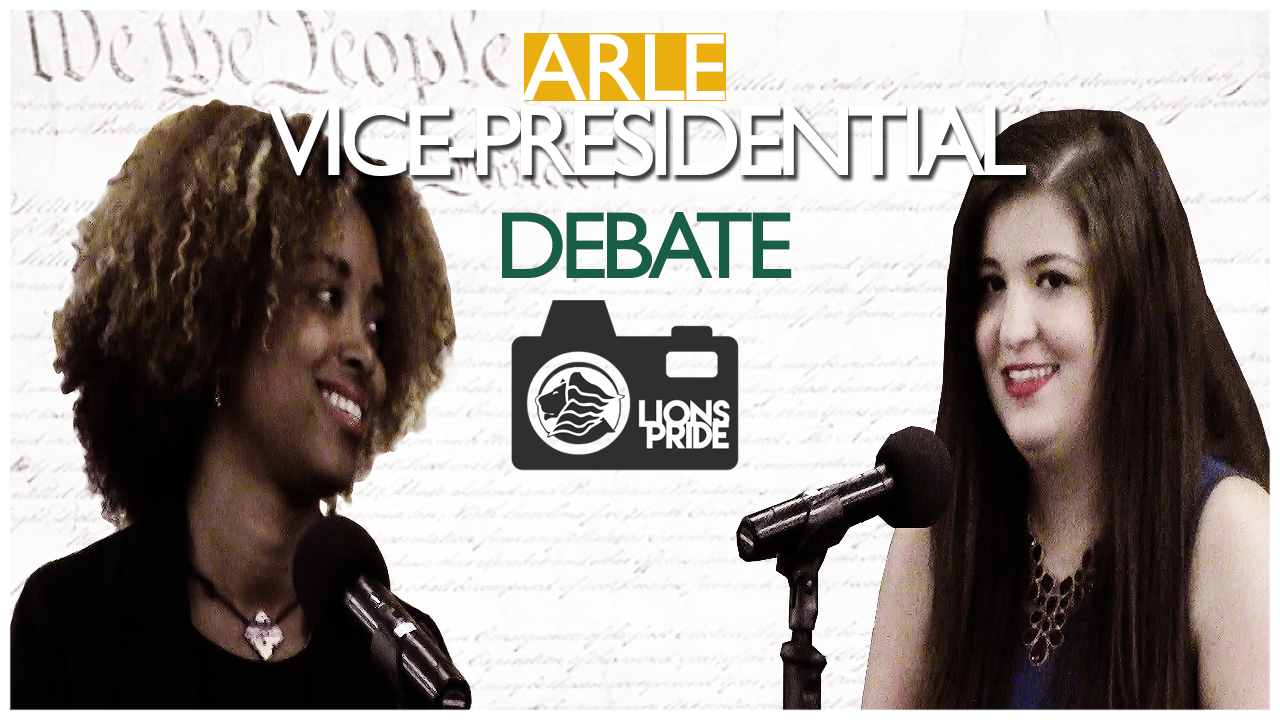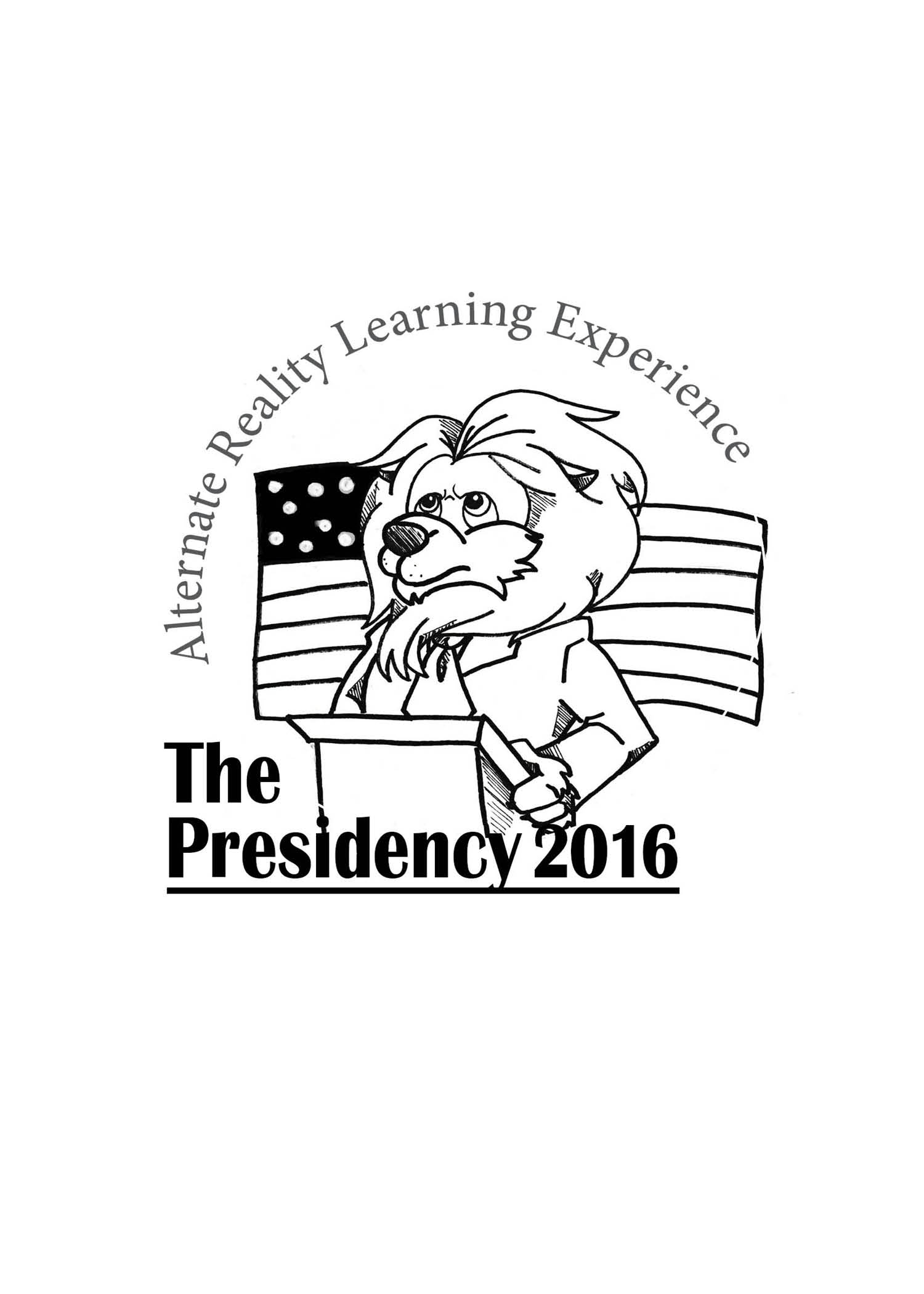Disclaimer: The following story, photos, and accompanying items are fictionalized and are part of Saint Leo University’s Alternate Reality Learning Experience (ARLE). The events described did not occur. The characters are fictional and any resemblance to any person living or dead is purely coincidental.


On Oct. 3, in the Greenfelder-Denlinger Boardrooms, students gathered to witness the vice presidential candidates clash over the most contemporary issues posed by student moderators at the Vice Presidential Debate.
As part of the Alternate Reality Learning Experience (ARLE), a University-wide mock presidential campaign, the vice presidential candidates Caterina Castillo and Angela Johnson participated in an explosive debate. Sophomore Amanda Miceli is portrayed as Madame Caterina Castillo, Ambassador of Russia running with Republican presidential candidate Paul Friedman. Sophomore Sophie Metellus played Angela Johnson, Senator of Florida, running on the Democratic ticket with the Howard administration.
The moderators questioned the vice presidential candidates on topics within the four categories of foreign policy, education, immigration, and the economy.
The topics among foreign policy included how to prevent further terrorist and ISIS attacks, opinions on joining Obama’s veto on allowing victims of 911 to sue Saudi Arabia, opinions on the deals made with Obama with Iran, Syrian immigration, and if the process of immigration should be made easier.
Castillo does not believe that the war on terrorism needs to be a ground war, but that through “diplomatic means, and with NATO allies involved can keep America safe.” Castillo believes in the continued lawsuit against Saudi Arabia. Castillo does not support the UN’s decisions.
“Iran should have to allow inspections of nuclear weapons like every other nuclear weapon-holding country,” said Castillo.
Johnson, too, is not in favor of using ground troops.
“Working closely with the military can keep America safe from terrorist attacks,” said Johnson.
She believes the lawsuit against Saudi Arabia would cause unnecessary conflicts with the allies. She stands behind Obama’s deal with Iran, that it will alleviate issues and bring unity instead of keeping animosity.
Immigration discussion topics included opinions on Syrian immigration, if the process of immigration should be made easier, federal government funding to immigrant sanctuary cities, and if employers be required to provide employee legal status.
In regards to Syrian immigrants, Castillo feels that this system needs drastic reform.
“If immigrants cannot verify their backgrounds, like most civil war states cannot, then, it could compromise national security,” she said.
Castillo would agree to let only Syrians who have verifiable backgrounds into the U.S., and stated that “harsher sanctions should be made on those choosing to take the illegal path of entrance because illegal immigrants do not provide background checks and do not usually pay taxes.”
Castillo disagrees with funding sanctuary cities.
“This is major threat to national security, not having the legal status of workers could lead to the endangerment of the nation- it could make the nation more vulnerable to terrorist attacks,” she said.
Johnson supports immigration of Syrians. She believes in a “melting-pot basis, that anyone should be allowed to enter our grounds, and that certain aspects of background checks deny chances of freedom.” Johnson feels that immigration should be made easier and readily available, for those that choose the legal path of amnesty, through easier background checks and in terms of costs and paperwork.
“Federal funding should be determined on a state-by-state, city-by-city basis,” she said. She believes that “employers should know who is working for them, but the differences in circumstances per verification should be taken into consideration.”
An education expert was brought among the moderators to ask questions concerning Common Core, decisions made in educational funding, property taxes to fund education, college made free, retention rates tied to funding.
Johnson is a firm believer of Common Core, which allows students to stay on the same educational level and pace.
“There should be more tax dollars and larger amounts taxed on lotteries to be used to support education, as Common Core prepares students to take the SAT and ACT, needed to further their education,” she said.
Johnson also feels that property taxes should be used to better the education system, and commends the idea of free college.
“College is an opportunity, it should not be decided based on the ability to pay through-the-roof prices, that’s ridiculous,” she said. Johnson is against retention rates being tied to funding as it should not be graduation-rate based.
Castillo would prefer Common Core to be eliminated.
“Common Core teaches students how to pass exams versus providing a well-rounded education, it should be left to each board of education per state to decide,” she said. “Grants should be given to states to disperse among themselves, funding should be used to get back on the track for success, as the US is drastically falling behind developing countries in education because of Common Core.”
Castillo stated, “Using property taxes to fund education would be enabling the children from the 1 percent and creating more of a gap, when funds need to be more evenly distributed.” She feels that only “funding for those in the armed forces should remain free and available,” while free college would allow those ineligible and unable to get into college. Retention rates and funding would “create incentives for teachers to teach students to pass tests.”
For the economic category, the topics mentioned were growth in unemployment, minimum wage, and the tax burden of the 1 percent status quo paying 50 percent of all taxes.
Castillo’s proposition to fix the economy is to reverse reckless spending, restructure the budget, lower taxes by slashing the budget and put funding into domestic programs.
We need to stop over funding the military and stop flaunting what is already the largest military,” she said.
She believes increasing minimum wage would raise unemployment rates and inflation. In response to the tax burden on the 1 percent, Castillo believes that “lowering individual and corporate taxes will help lower taxes across the board.”
Johnson responded, “We need to focus on ways to create more jobs to build up the country; we cannot afford to cut military fundings, as we need the military to prevent homeland crises.”
In terms of minimum wage, she believes in increasing it to a certain extent to making living wages easier to obtain, but capping it off at $11, as professionals should not be making the same as unskilled laborers.
“The 1 percent should not be complaining when they have extra, as compared to those that can barely afford to live,” she said.
Madame Ambassador Castillo’s closing statement entailed, “The advocate for the people and the change that America needs to fix its broken economic, immigration, and education system is the Friedman-Castillo administration.”
Sen. Johnson’s closing statement consisted of, “The Howard-Johnson administration has the people at heart, we are not focused on cutting funding, we are about all the people being heard and understood.”
This Vice Presidential Debate was a warm up event for the Presidential Debate, in which Howard and Friedman will go head-to-head. The event will be held in the Greenfelder-Denlinger Boardrooms on Nov. 7 at 6 p.m. to determine the future “president.”




